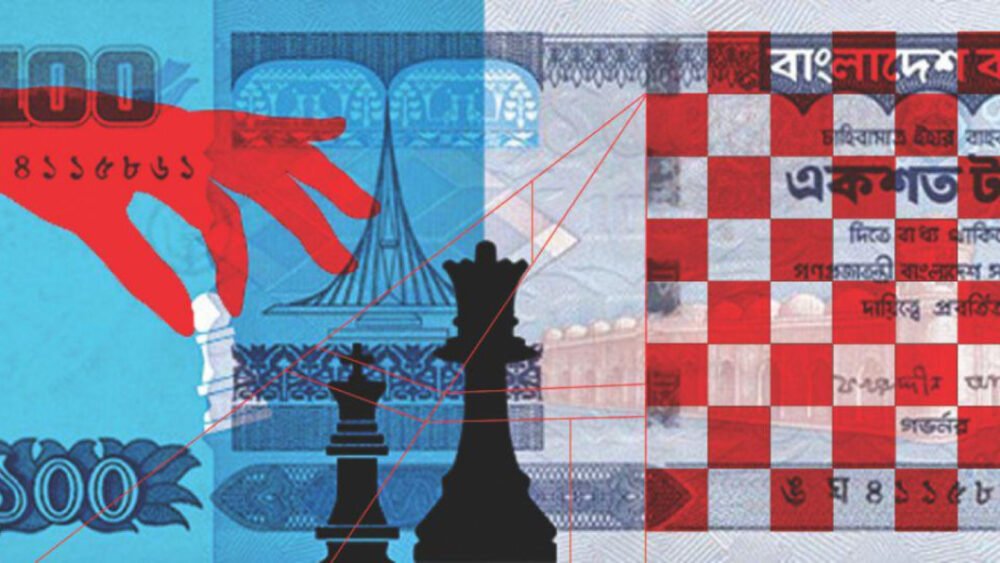।। Badiul Alam Majumdar ।।
A couple of weeks ago, our prime minister talked about protecting Bangladesh from a possible famine in the coming days. More recently, her power and mineral resources adviser warned us about possible daylong power cuts in the future. We are already facing an unprecedented financial crisis due to reckless cronyism, mismanagement, rampant looting and plundering, and siphoning the loot abroad. All our institutions are crumbling because of politicisation, inefficiencies, and corruption. Our electoral system has broken down, representing serious democratic deficits. Signs of governance failure are visible everywhere. In the meantime, prices of essentials have been skyrocketing, causing serious hardship for common people.
Although troubles have been brewing for quite some time, they have gotten worse in recent months, creating potentially unprecedented crisis on economic and political fronts. Unfortunately, the growing problems are largely attributable to mismanagement and broken promises of the ruling party.
Before the 2008 election, the Awami League published an election manifesto titled “Dinbodoler Sanad” or “A Charter for Change,” making wide-ranging pledges. The party assured the voters that they envisioned “a democratic system where people choose their government freely and get services from it without hassle, enjoy freedom from fear and intolerance, live with dignity; where every citizen is assured of social justice, environmental protection, human rights and equal opportunities; and where the rule of law and good governance flourish.” Yet, Bangladesh saw two failed elections in 2014 and 2018, and the country is now widely viewed as an autocracy.
In view of the prevailing serious power shortage, Dinbodolar Sanad promised a comprehensive long-term policy for the country’s energy sector focusing on economic usage of oil, gas, coal, hydro power, wind power and solar energy. It also promised to prioritise exploration and exploitation of oil and new gas fields. Yet, according to experts, because of cronyism, corruption and mismanagement, the present crisis in the power sector would have occurred even without the war in Ukraine.
The Awami League’s 2008 election manifesto also promised to take effective actions against corruption. “Multi-pronged measures to fight corruption will be put into place. Powerful people will have to submit wealth statements annually. Strict measures will be taken to eliminate bribes, extortion, rent-seeking, and corruption. Strong measures will be taken against those having unearned and black money, against loan defaulters, tender manipulators, and users of muscle power in every stage of state and society,” it said. In subsequent years, the government declared zero tolerance against corruption. Yet, corruption is out of control now.
Dinbodoler Sanad made concrete commitments regarding governance: “Genuine independence and impartiality of the judiciary will be ensured. Extrajudicial killings will be stopped. The judgment of Bangabandhu murder case will be made effective and the retrial of jail killings will be held. Trial of real criminals responsible for the grenade attack on August 21, 2004 will be arranged through proper investigation. Rule of law will be established, the Human Rights Commission will be strengthened and made effective, and an ombudsman will be appointed. Human rights will be strictly enforced.” But the government reneged on all promises except for the implementation of the Bangabandhu murder case verdict and the retrial of the 2004 grenade attack.
Dinbodoler Sanad also pledged that the “ongoing reform programme of the Election Commission and electoral system will continue… security and rights of religious and ethnic minorities will be ensured. Courtesy and tolerance will be inculcated in the political culture of the country. Militancy and extortion will be banned. Awami League will take the initiative to formulate a consensual and unanimous charter of political behaviour.” Yet, political intolerance in Bangladesh is now at an all-time high, and there are serious allegations of the reconstitution of Election Commissions with partisan individuals who essentially destroyed our electoral system.
The ruling party’s Dinbodoler Sanad further committed that the “administration will be freed from politicisation and be pro-people… in order to provide security to every citizen, police and other law enforcement agencies will be kept above political influence. These forces will be modernised to meet the demands of the time.” Unfortunately, flagrant politicisation of the bureaucracy and law enforcement agencies have now become the biggest threats to our democracy and the governance system.
As for the local government, Dinbodoler Sanad pledged that “union, upazila and district councils will be strengthened through decentralisation of power. District councils will be transformed into centres for implementation of education and healthcare programmes and all other development plans, as well as for the maintenance of law and order. Every union will be made the headquarter for development and administration of the area and be developed as a planned rural township.” Instead, local government bodies in Bangladesh have become increasingly ineffective, corrupt, and largely subservient to the functionaries.
”We and especially our government in Bangladesh must move away from the culture of denial and develop the confidence of being self-critical. No government in the world has ever fallen for being self-critical. On the contrary, it fell from power for being s”
It is clear that the democratic deficits and governance failures that prevail in Bangladesh have destroyed its accountability structure – vertical accountability of the government to the people created through credible elections, and horizontal accountability through a system of checks and balances ensured by independent institutions. Such a dearth of accountability along with the absence of rule of law have not only been behind the creeping economic and political crises in the country, but they are also the main obstacles to overcoming the daunting challenges created by the pandemic and the Russia-Ukraine war.
The government is trying to deal with the growing economic crisis by borrowing from the International Monetary Fund (IMF) and others, and are now negotiating with the lenders. It is certain that our authorities will agree to certain conditionalities for economic reforms. But economic reforms without concomitant political reforms will be like pouring water into a jar with big holes underneath.
Dr Badiul Alam Majumdar is secretary of SHUJAN: Citizens for Good Governance.

